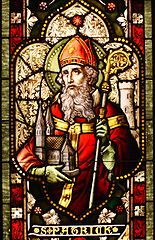
The Life And Writings Of Saint Patrick -Saint Patrick
VI.—PATRICK AT ORAN
Patrick does not appear to have gone further south on the present occasion, but turned back to Magh Ai, which was in Roscommon the centre of his missionary activity, as Tara was in Meath. He had, however, others amongst his household who wished to get churches in that fertile territory, and who, it seems, began to show signs of impatience at delay. Amongst them were certain Franks who had accompanied him from Gaul. We are now told that ‘they went from him,’ as if to set up for themselves. So Patrick followed them, it would seem—fifteen brothers and one sister, or perhaps five brothers and one sister; but only the names of three are given, Bernicius, Hibernicius, and Hernicus, with their sister Nitria. And Patrick gave them many places to dwell in and serve God and the people, but the chief place he gave them was Imgoe Baislicc, ‘between Hy Maine and Magh Ai,’ that is it was just on the boundary. Sachellus was their head, but he was not one of the Franks. Baslic is still the name of a parish church in the diocese of Elphin, and a glance at the map will show that it is only a little north of the boundary line between Hy Many and Magh Ai, as we have already described it. The old church was, we believe, near Castleplunket. It would appear that the Frenchmen had found out the place for themselves, or rather Patrick showed it to them ‘with his finger’ from the summit of the hill of Oran a little further south, where he was at the time engaged in founding a church. Although they went off to provide for themselves, they had returned to Patrick that he might sanction their choice of the places they had found; they were clearly unwilling to set up anywhere without his express approval. The graphic language in which Tirechan tells how from the summit of the Hill of Oran Patrick pointed out with his finger the site of the church of Baslic on the high ground some five miles away due north, is a striking proof of the authenticity of the narrative, which he must have had directly or indirectly from eye-witnesses. Incidental touches of this kind, which are frequent both in Tirechan and the Tripartite, clearly show that the original narrative was both truthful and accurate.
A stump of a round tower still marks the site of the ancient church of Oran. The name Uaran means a cold spring; and Oran deserves it, for a beautiful spring pours out its abounding waters close to the tower and the ancient church. Patrick loved this place, for he had a keen eye for the beauties of nature, and was charmed by the swelling fountain watering those green and fertile fields; and he enjoyed the noble prospect which is revealed from the summit of the hill. He even became poetic in its praises:—
Uaran Gar!
Uaran, which I have loved, which loved me.
Sad is my cry, O dear God,
Without my drink out of Uaran Gar,
Cold Uaran,
Cold is every one who has gone from it (with sadness),
Were it not my King’s command,
I would not wend from it, though the weather is cold,
Thrice I went into the land,
Three fifties was the number (with me),
But with thee …
Was my consolation, O Uaran.
The place is as beautiful as it was of old, but it would be hard to get ‘three fifties’ of human beings there now. Of bullocks there are plenty, but of men there are few. One or two wretched cottages and the broken tower now mark the desolate site of the church on that fair but lonely hill which Patrick loved so well.
Over this church of Oran, Patrick placed Cethecus, the brother of Sachell, or Sachellus, of ‘Baslic.’ He was a holy youth, and Tirechan says that he crossed the river Suck without wetting his feet or his shoes, which was taken as a proof of his sanctity. It would appear also that Patrick’s family at the time numbered three fifties, which is not wonderful, if we bear in mind that he had to make provision from amongst them for the spiritual care of the young churches which he was every day founding. Many of them still were Gauls and Britons.

 Keep Site Running
Keep Site Running